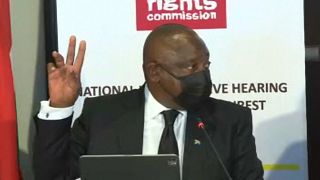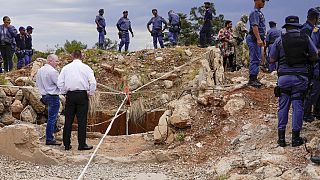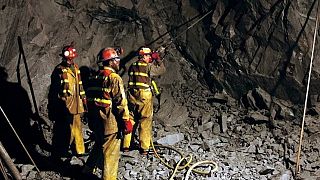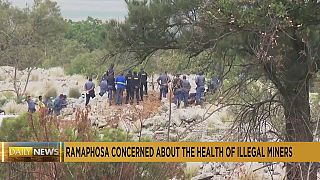South Africa
South Africans on Saturday cleaned up shopping centres and stores looted during a week of shocking violence that rocked the country and left more than 200 dead.
Aid organisations also handed out food in communities that had been cut off from main roads or where food shops were ransacked in the unrest.
The violence -- the worst in post-apartheid South Africa -- erupted after former president Jacob Zuma was sentenced to 15 months in jail for snubbing a corruption inquiry.
His successor President Cyril Ramaphosa, who came to office promising to curb graft, said the riots were a "coordinated and well-planned attack" on the country's young democracy.
"Using the pretext of a political grievance, those behind these acts have sought to provoke a popular insurrection," Ramaphosa said in a televised address on Friday night.
The rioting caused widespread destruction, leaving thousands of businesses trashed, including many retail shops that were specifically targeted.
As an uneasy calm set in Saturday, residents in the hard-hit KwaZulu-Natal province swept up debris at the Dube Village Mall in the township of Inanda, north of Durban, shovelling it into refuse bags.
Behind them walls topped with spikes and razor wire had been spray painted with the words "Free Zuma".
Zuma, whose home province is KwaZulu-Natal, commands support among loyalists in the ruling African National Congress (ANC), who portray him as a champion of the poor.
Walking across a charred shop, Sikhumukani Hongwane, a private security guard was on duty when the mall was attacked last Sunday, just after Ramaphosa had addressed the nation.
He saw a mob of people starting to burn a nearby garage and he fled. He is still haunted.
"We are scared, even now. All the memories...are coming back." he said. "We can't sleep".
Many in the province are now going hungry after food stores were looted and burned, or cut off from suppliers as roads closed.
The government, humanitarian aid agencies, charities and churches have started moving food to people in need, including hospital patients and families.
"We are loading bread for staff for five hospitals," Imtiaz Sooliman, leader of Gift of the Givers, said.
Sooliman said that his food convoys were being escorted by armed security.
"Yesterday we sent food for patients in private hospitals -- they had no food to feed patients. They have all the money but they can't buy anything, they called us saying patients haven't eaten," he said.
The organisation was also delivering food parcels door-to-door after a government minister told him Friday that dozens of Durban areas had no access to food, Sooliman added.
The few shops that were spared are opening for a few hours and in some places price of bread has almost doubled.
"It is mayhem because the few shops that are here cannot accommodate the whole community. The few stores we've got, (have) got snaking queues like people are going there to vote," said Siyanda Nxumalo, a community activist in Inanda.
- 'Poorly prepared' -
Traffic was back to normal along a main highway linking the north to the port city of Durban after it had been closed for much of the week.
Ramaphosa said the instigators had "sought to exploit the social and economic conditions under which many South Africans live -- conditions that have worsened since the onset of the coronavirus pandemic".
He said that business owners told him it would take "a few months" to restore normal operations following the destruction, interrupting supply chains and raising the spectre of shortages.
Of the 212 people killed, 180 died in KwaZulu-Natal, according to government figures. Some of the fatalities were shot and others died in looting stampedes.
More than 2,500 people have been arrested for various offences linked to the violence, including theft.
The government said all but one of the suspected masterminds are at large.
Ramaphosa admitted that his government was "poorly prepared for an orchestrated campaign of public violence, destruction and sabotage of this nature".
He has called up army reserves and ordered the deployment of 25,000 troops -- 10 times the number that he initially deployed.
Opposition politicians have condemned the government's handling of the crisis, calling on Ramaphosa to ensure the suspected masterminds are arrested and charged.











02:18
Highly-anticipated Wicked makes its cinema debut in South Africa
01:07
Pro-palestinian demonstrators protest in Rio de Janeiro as G20 summit unfolds
01:14
World leaders gather in Brazil for G20 summit amid global tensions
01:00
Chidimma Adetshina crowned Miss Universe Africa and Oceania
01:00
Maori MPs stage haka protest against treaty bill
01:10
South African beauty queen withdraws from Miss Universe pageant